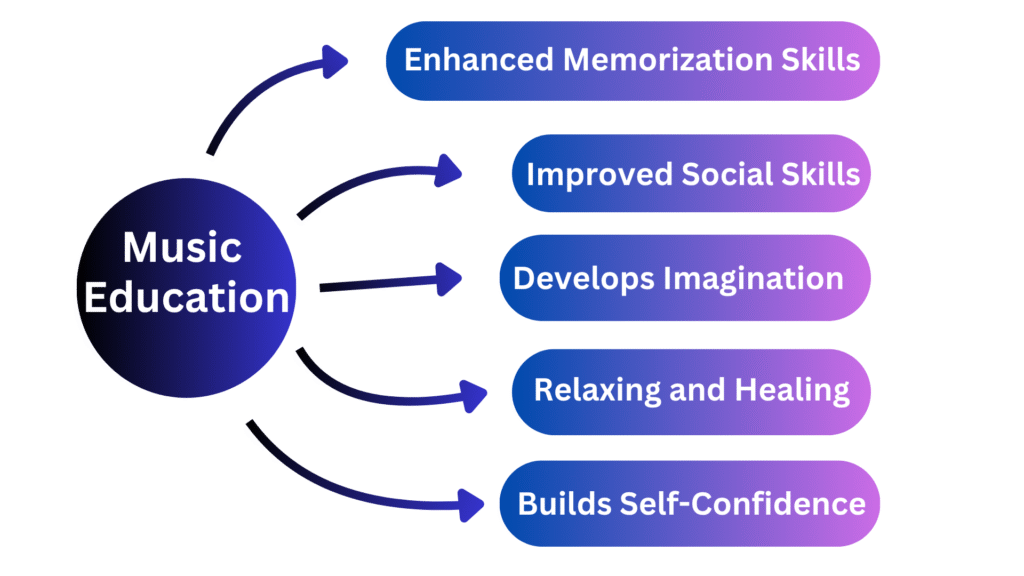Why Music Matters in Our Schools
Music is a universal language that resonates with the human soul. Whether it’s the hum of a morning tune or the beat of a classroom song, music has the power to uplift, inspire, and educate. When I think about the most memorable moments from school, music often plays a central role. It bridges emotions, strengthens memories, and cultivates creativity.
In this article, I’ll explore the vital role of music education in school, shedding light on its importance, impact on learning, and broader contributions to student development. The purpose is to illustrate why music should not be viewed as an optional subject, but as a core component of a well-rounded education.
Table of Contents
The Importance of Music Education in Schools
To me, music education in school is not just about learning instruments or singing songs. It is about nurturing the whole child. Historically, music has been an integral part of human expression and culture. From ancient chants to modern symphonies, it has always played a role in shaping societies.
In today’s fast-paced academic world, music provides students with a much-needed emotional and creative outlet. It’s a space where they can explore their identity, express emotions, and connect with peers. Music instills discipline, patience, and passion—qualities that go far beyond the music room.
Music Education and Its Impact on Student Learning
Music education in school engages the brain in unique and complex ways. It’s more than entertainment; it’s a tool for cognitive development. Learning music strengthens neural pathways and improves functions such as memory, attention, and language skills.
When students learn music, they are not just memorizing notes; they are training their brains to process sound, structure, and emotion simultaneously. This multi-sensory experience caters to diverse learning styles—whether auditory, visual, or kinesthetic.
Benefits of Music Education: A Symphony of Growth
Enhanced Memorization Skills
Music naturally enhances memory. Whether it’s remembering lyrics, rhythms, or sheet music, students learn to retain complex information. I’ve seen students who struggle in traditional subjects show remarkable memory retention when engaged in music classes.
Music in School Helps Keep Students Engaged
Music is inherently engaging. It involves movement, rhythm, emotion, and collaboration. In classrooms where music education in school is prioritized, student participation and enthusiasm often soar. Music classes become a safe space for self-expression and joy.
Improved Social Skills
Group music-making activities like bands, choirs, and orchestras foster social interaction. Students learn to listen, harmonize, and work together toward a common goal. These experiences cultivate empathy, cooperation, and respect for others—key skills for life.
Develops Imagination
When students interpret a musical piece, they must visualize, imagine, and feel the story it tells. This nurtures creativity and abstract thinking. Music invites students to dream and see the world through new lenses.
Develops Creative Thinking
Creativity in music goes beyond performance. It includes improvisation, composition, and problem-solving. Students are encouraged to experiment, innovate, and develop original ideas. Music education in school becomes a laboratory for creative minds.
Helps in Relaxing and Healing
Music has therapeutic power. It soothes anxiety, elevates mood, and offers a safe outlet for emotions. In a world where stress among students is rising, music offers healing and balance.
Builds Self-Confidence
Performing in front of an audience, mastering an instrument, or writing a song provides students with a sense of accomplishment. These experiences build self-confidence and encourage them to embrace challenges in other areas of life as well.

Strategies for Effective Music Education in School: My Vision for Success
Strong music programs require vision, leadership, and support. Here’s how I believe we can ensure quality music education in school:
Effective Instructional Leadership in Music Education
The backbone of a great music program is a passionate and skilled educator. Teachers who inspire, innovate, and adapt bring music to life. Equally important is administrative support. Schools must prioritize music education through funding, scheduling, and acknowledgment.
Diversity in musical content also matters. Including various genres and cultures ensures that students see their identities reflected in the curriculum.
Integrating Music with Other Subjects
Music can enhance subjects like math (rhythm and fractions), history (songs from different eras), and language arts (lyrical interpretation). This cross-curricular approach strengthens learning and demonstrates the relevance of music.
Providing Resources and Facilities
Quality instruments, rehearsal spaces, and technology are essential for effective music education. Investing in these resources shows students that music is valued.
Fostering Community Involvement and Performances
Music thrives when shared. Concerts, school events, and community programs allow students to showcase their talents and gain real-world experience. Involving parents and the wider community helps build strong support networks.
FAQs: Answering Common Questions About Music Education
Q 1. How does music education benefit academic performance in schools?
Studies and experiences alike show that music improves cognitive abilities. Skills like pattern recognition, sequencing, and memory transfer to subjects like math and reading. Music trains the brain to think critically and solve problems creatively.
Q 2. Is there evidence supporting the role of music in enhancing creativity?
Yes! Both research and anecdotal accounts support the idea that music sparks divergent thinking. From improvising melodies to composing songs, students engage in high-level creative processes. This translates into broader creative capacity in academics and life.
Q 3. What impact does music education have on social and emotional development?
Music helps students understand and express emotions. In group settings, it nurtures empathy, cooperation, and belonging. The emotional intelligence gained through music education helps students navigate their social worlds more effectively.
Q 4. Are there long-term benefits of incorporating music into the school curriculum?
Absolutely. Music fosters lifelong skills: discipline, patience, creativity, confidence, and cultural appreciation. Students often carry a love for music into adulthood, enriching their personal and professional lives.
Conclusion: The Enduring Melody of Music Education
Music is not just an art form; it is a powerful educational tool. Music education in school enhances academic performance, builds social-emotional skills, and cultivates creativity. It teaches students to listen deeply, express fully, and collaborate meaningfully.
We must champion music as a core subject, not an extracurricular luxury. In doing so, we nurture well-rounded individuals prepared for the challenges of the modern world. Let us keep the music playing in our schools—for the benefit of every child, every classroom, and every community.

